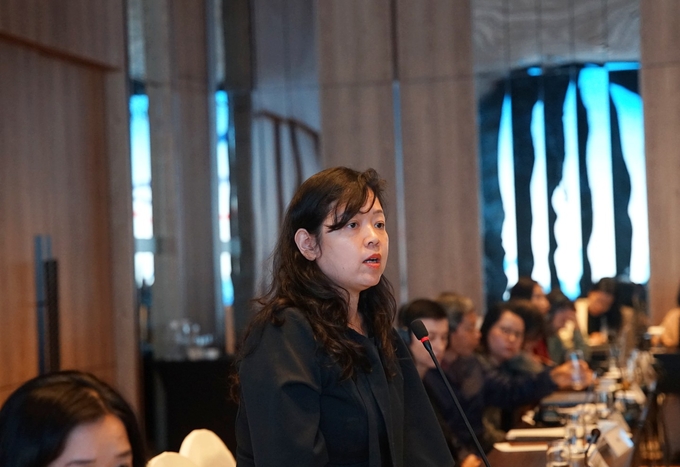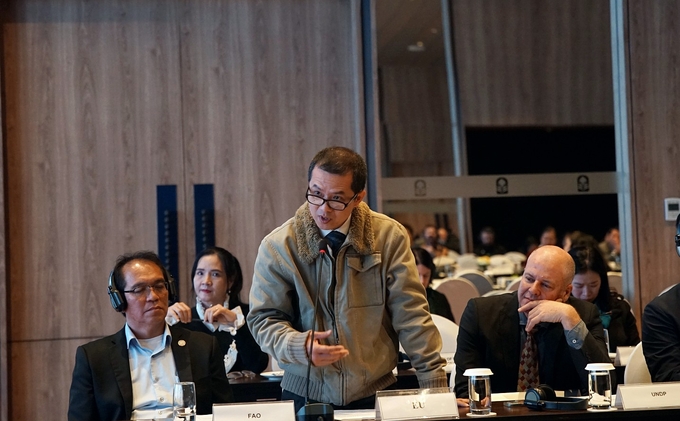November 22, 2025 | 20:20 GMT +7
November 22, 2025 | 20:20 GMT +7
Hotline: 0913.378.918
November 22, 2025 | 20:20 GMT +7
Hotline: 0913.378.918

According to a representative from USAID, regulations on intersectoral coordination and funding will need to be added, with a particular emphasis on data sharing and coordination at the local level. Photo: Kieu Chi.
"While central-level policies are relatively well-coordinated, many localities still face limitations," said Ms. Nguyen To Nhu, Director of the USAID project "Enhancing local capacity in disease prevention, surveillance, and response." She added that some provinces, like Dong Nai, have implemented coordinated action plans between veterinary and health sectors. However, in many other areas, information and data are only shared when an outbreak occurs.
Ms. Nhu emphasized that to build an effective intersectoral data-sharing system, there needs to be consensus between the two ministries co-chairing the partnership framework, the Ministry of Health and Ministry of Agriculture and Rural Development. At the same time, an intersectoral rapid response team model must also be established to enhance the ability to respond quickly and effectively.
According to Mr. Nguyen Do Anh Tuan, Director of the International Cooperation Department, the One Health initiative has received significant attention at the central level from researchers and international development partners. However, at the local level, awareness of the initiative is still limited, and its practices have not been implemented uniformly.
The biggest challenge is how to ensure that policies and activities under programs and projects translate into real-life actions, especially for farmers, consumers, and local authorities. To address these issues, there needs to be stronger connection between the central and local levels, while also promoting intersectoral funding, building effective coordination mechanisms, and conducting widespread communications to raise awareness and enhance implementation capabilities at all levels.
According to representatives from the World Bank (WB), the One Health framework needs to focus on addressing issues such as the increasing demand for animal protein, the confinement of wildlife, and climate change, key drivers of zoonotic diseases.
In the context of 2030 being the year for the Sustainable Development Goals (SDGs) assessment, One Health should not just be an initiative, but must become a national priority with stronger legal frameworks than the current Circular 16, to help Vietnam achieve its development goals.

One Health is not just an initiative; it needs to become a national priority to help Vietnam achieve its sustainable development goals. Photo: Kieu Chi.
During the discussion at the One Health High-Level Forum, Mr. Tong Xuan Chinh, Deputy Director of the Department of Livestock, provided an evaluation of the results from domestic and international organizations, which align with the approved framework. However, as the period from 2025-2030 approaches, several proposals need to be considered:
Firstly, international organizations view the transmission of diseases from animals to humans as a crucial issue. It is necessary to clearly identify the sources of pathogens, such as bacteria and viruses, in order to develop technical solutions and effectively assess risks. The collaboration between the Ministries of Health, Agriculture and Rural Development, and Natural Resources and Environment will help build a robust surveillance system and assess the evolution of diseases over different phases, as seen in the case of H5N1 avian flu.
Secondly, coordination efforts are essential, especially in controlling epidemics and ensuring food safety. Therefore, consideration should be given to developing a shared database, digitizing information, and creating useful communication tools so that agencies, international organizations, and sectors can stay updated and take appropriate actions.
Thirdly, the government’s multi-sectoral, interdisciplinary approach and clear orientation on coordination between ministries for the coming period should specify responsibilities and tasks to optimize coordination effectiveness and management.
Translated by Kieu Chi

(VAN) Official Telegram No. 226/CD-TTg, issued on November 21, 2025, mandates enhanced management and utilization of national reserves to support flood response and relief efforts in the Central Region.

(VAN) The Politburo has demanded a high concentration of efforts on urgent relief tasks, ensuring absolute prevention of hunger, cold, and shortages of clean water or medicine among the population.

(VAN) Water resources during the 2025–2026 dry season in the Mekong River Basin basically meet domestic use and production needs, but localized shortages may still occur due to saltwater intrusion.

(VAN) Vietnam and Japan have committed to deepening cooperation on projects under the Joint Crediting Mechanism (JCM), improving waste management, and advancing the circular economy.

(VAN) Digital transformation is becoming a core driver of proactive, precise, and safer management of dams and reservoirs nationwide.

(VAN) This assistance supports people who temporarily relocate or evacuate, as well as communities affected by major storms from late September to now.

(VAN) Viet Nam will host the 8th ASEAN Heritage Parks Conference, bringing together over 320 delegates and reaffirming its role in regional nature conservation.